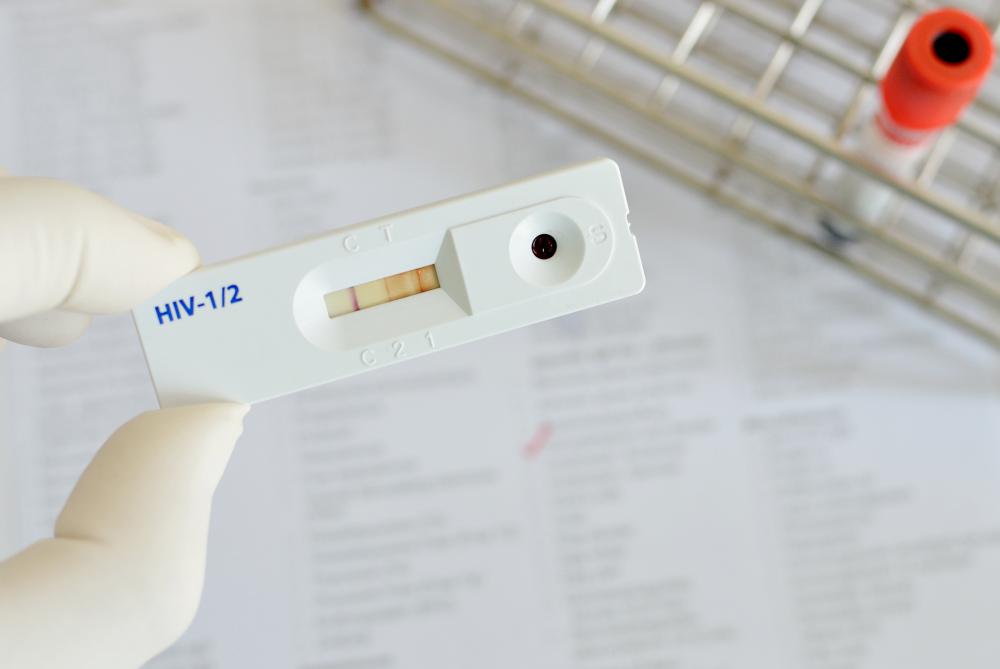At WiseGEEK, we're committed to delivering accurate, trustworthy information. Our expert-authored content is rigorously fact-checked and sourced from credible authorities. Discover how we uphold the highest standards in providing you with reliable knowledge.
What is Immune Deficiency?
Immune deficiency is a medical condition in which a patient's immune system is not functioning normally, leaving him or her vulnerable to infections. A patient with an immune deficiency is said to be immunodeficient. There are a number of causes and potential treatments for malfunctions of the immune system which can vary from injections with immune globulin to hospitalization and isolation to minimize exposure to infectious agents.
In some patients, deficiencies in immune function are congenital, and the patient has what is known as a primary immune deficiency. These conditions are usually caused by lack of production of certain cells involved in the immune system, as in the case of Bruton's agammaglobulinemia, in which production of B lymphocytes is insufficient and the patient experiences disorders of immune function. Primary immunodeficiency can be inherited, or the result of a spontaneous mutation.

More commonly, immune deficiency is acquired as a result of disease or the use of certain medications. The human immunodeficiency virus (HIV) infamously causes immune deficiencies, as do a number of medications, such as the drugs used in chemotherapy. A state of immune deficiency may also be deliberately induced, classically in the case of an organ transplant, in which the patient takes drugs to suppress the immune system to reduce the risk of rejection of the donor organ.

Doctors can diagnose patients as immunodeficient with the use of blood tests and a patient interview. Depending on what is causing the immunodeficiency, treatments can vary. Specific immunoglobulins can be introduced to the patient to address shortages, for example, or the patient may be offered a stem cell transplant. Special care must also be taken by immunodeficient patients to reduce their exposure to potentially infections agents. This care includes regular hand washing, the use of prophylactic antibiotics before surgical procedures, avoiding people who are sick, and cooking food thoroughly.

In a patient who has an immune deficiency, a minor infection can become deadly. The patient also usually struggles with constant low-grade illness as a result of the defective immune system, which makes it difficult for the patient to fight harmful substances he or she is exposed to. Family members and friends of the patient must observe a number of precautions to avoid making the patient sick, which can include wearing masks around the patient, avoiding contact with the patient while sick, washing hands frequently, and keeping the patient's environment as clean as possible.
AS FEATURED ON:
AS FEATURED ON:



















Discussion Comments
@ddljohn-- Except for acquired immonodeficiency diseases, like AIDS, I believe all of them are caused by a missing gene that prevents the immune system from working.
Scientists have even tried to replace the gene with some immune deficiency patients. But the results weren't too good. It worked for some but the complications were too much in others. So they've left this treatment option for now. Hopefully research will lead to better treatments soon.
I heard about the Bubble Boy disease in my classes. I believe the medical name for it is severe combined immunodeficiency disease. The name "bubble boy" was associated with it because apparently there was a boy with the disease in the 1970s that literally lived in a bubble to avoid getting sick.
It's a terrible disease because it is the most severe. Children who have it are born with it. I think in the past decades, many children died in the first couple of years. Now it is much better because bone marrow treatments have come out. But it's still such a challenge to keep those children healthy. My heart goes out to the families of SCID patients.
Do we know why some people are born with an immune deficiency? Is it a genetic factor or something else?
What I'm really afraid of is the overuse of antibiotics. I read that viruses are increasingly becoming tolerant to antibiotics. Could this be a cause of immune deficiency in the future?
Post your comments